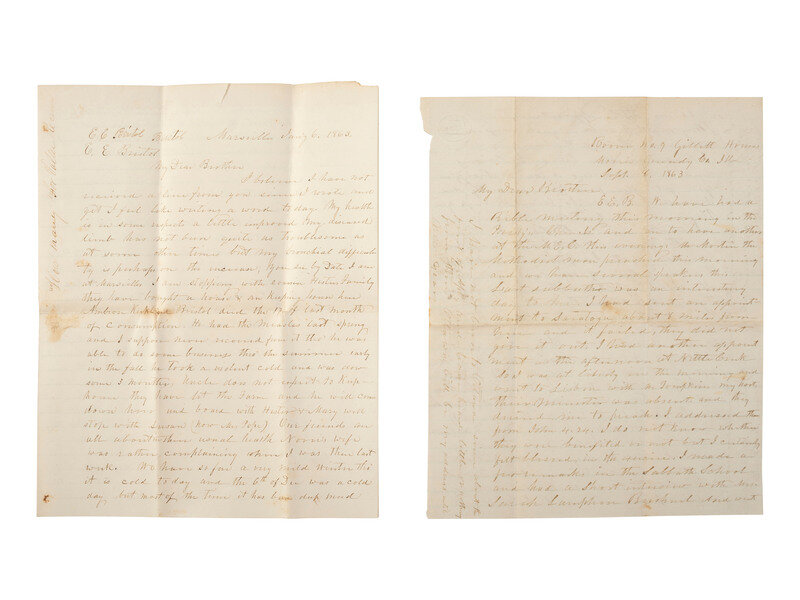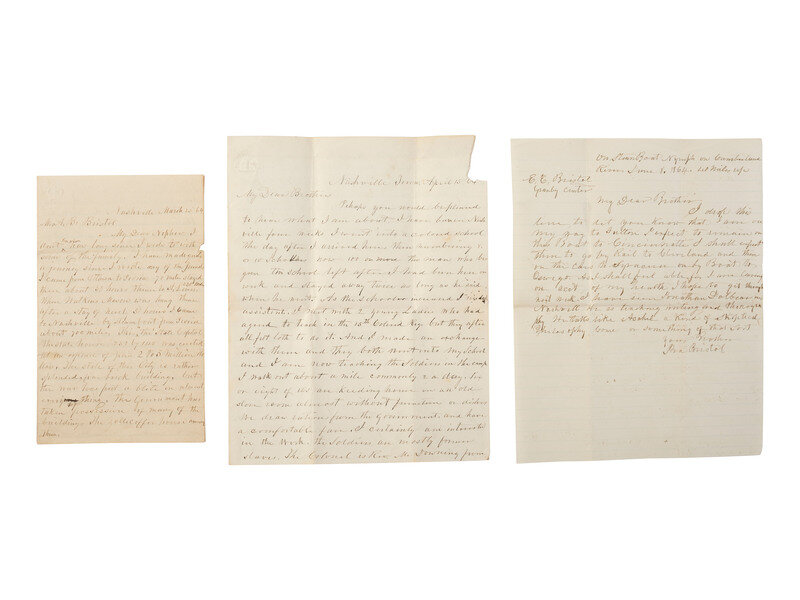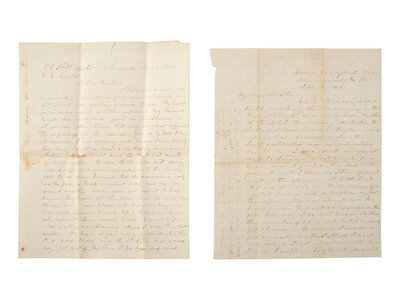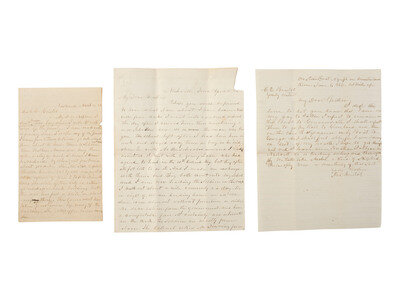[ENSLAVEMENT & ABOLITION]. A northern preacher's letters concerning teaching soldiers from the 15th United States Colored Infantry Regiment as well as students at a freedmen's school in Nashville, Tennessee. 1863-1864.
Sale 1310 - American Historical Ephemera and Photography, Featuring African Americana
Feb 27, 2024
10:00AM ET
Live / Cincinnati
Own a similar item?
Estimate
$1,000 -
1,500
Price Realized
$1,778
Sold prices are inclusive of Buyer’s Premium
Lot Description
[ENSLAVEMENT & ABOLITION]. A northern preacher's letters concerning teaching soldiers from the 15th United States Colored Infantry Regiment as well as students at a freedmen's school in Nashville, Tennessee. 1863-1864.
A group of 5 letters, spanning 6 January 1863 - 8 June 1864, written to family members by Ira Clinton Bristol (1799-1879?) while serving as an itinerant preacher and teacher of freedmen during the Civil War. Two of the letters describe in detail the Union-occupied city of Nashville, including references to "contraband," the establishment of freedmen's schools, and the education of former slaves serving in the United States Colored Troops.
Bristol's earliest letter demonstrates his empathy for the plight of enslaved African Americans, and expresses "ground[ of encouragement" in the 1862 decision of U.S. Attorney General Edward Bates "on the citizenship of colored men, reversing the infamous Dred Scott decision." By March 1864 Bristol is in Nashville, and he writes at length about "the great military center," noting: "There is some six hundred Freedmen just out of the City, they are in hardy circumstances they are in tents no school among them yet, there are four school[s] for colored people in Town but there is a decided feeling of opposition to the movement, a proslavery influence." He then continues saying that, along with two Quakers, he is in charge of a school of 30-40 African American "schollars [sic] and increasing." Just a few weeks later in April 1864, Bristol indicates that number of students is 100 or more, but that he is now teaching soldiers of the 15th U.S. Colored Infantry Regiment. The soldiers he reports are mostly former slaves, and "there are the agents and teachers from a half doz. different societies from as many different states" working with freedmen. Even in a Union-occupied city the formerly enslaved are not completely safe, as Bristol notes that, "A slaveholder from Alabama came among our men and endeavored to get back some of his enlisted slaves...They hate to give up their favorite institution...." A fascinating letter group which demonstrates the hunger for education amongst the formerly enslaved, as well as northern efforts to deal with the overwhelming number of freedmen who were continually coming into Union-held territory.
Ira Bristol was born in Connecticut in 1799, but removed to Granby, Oswego County, New York, sometime prior to 1850. The 1850 U.S. Federal Census identifies Bristol as a clerk, but by the early 1860s he has embarked upon a career as a traveling preacher, perhaps motivated by his strong anti-slavery views and the ongoing national conflict. The 15th US. Colored Infantry Regiment was organized in Nashville, Tennessee, beginning in December 1863, and was attached to Post and District of Nashville to August 1864. Bristol would not, however, remain with the 15th USCT for the duration of their time in Nashville. His last letter dated 8 June 1864 indicates that Bristol's health is poor and he is returning to Oswego. The 1870 U.S. Federal Census indicates Bristol remained in Oswego, with an occupation of "Colporteur," an employee of a religious society who distributes bibles and other religious tracts.
Condition Report
Auction Specialist



